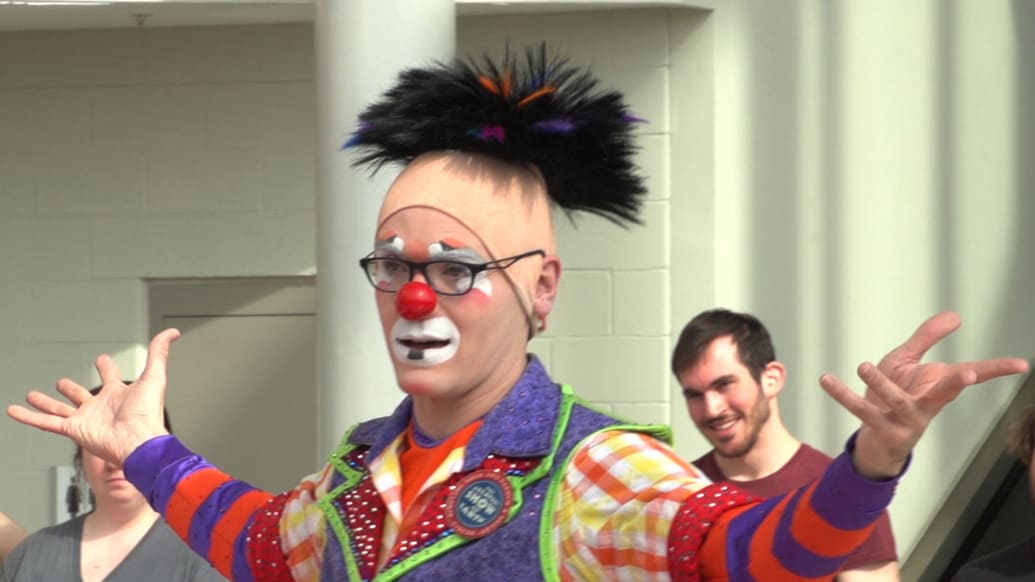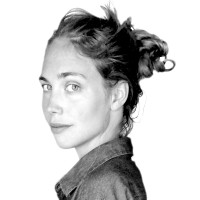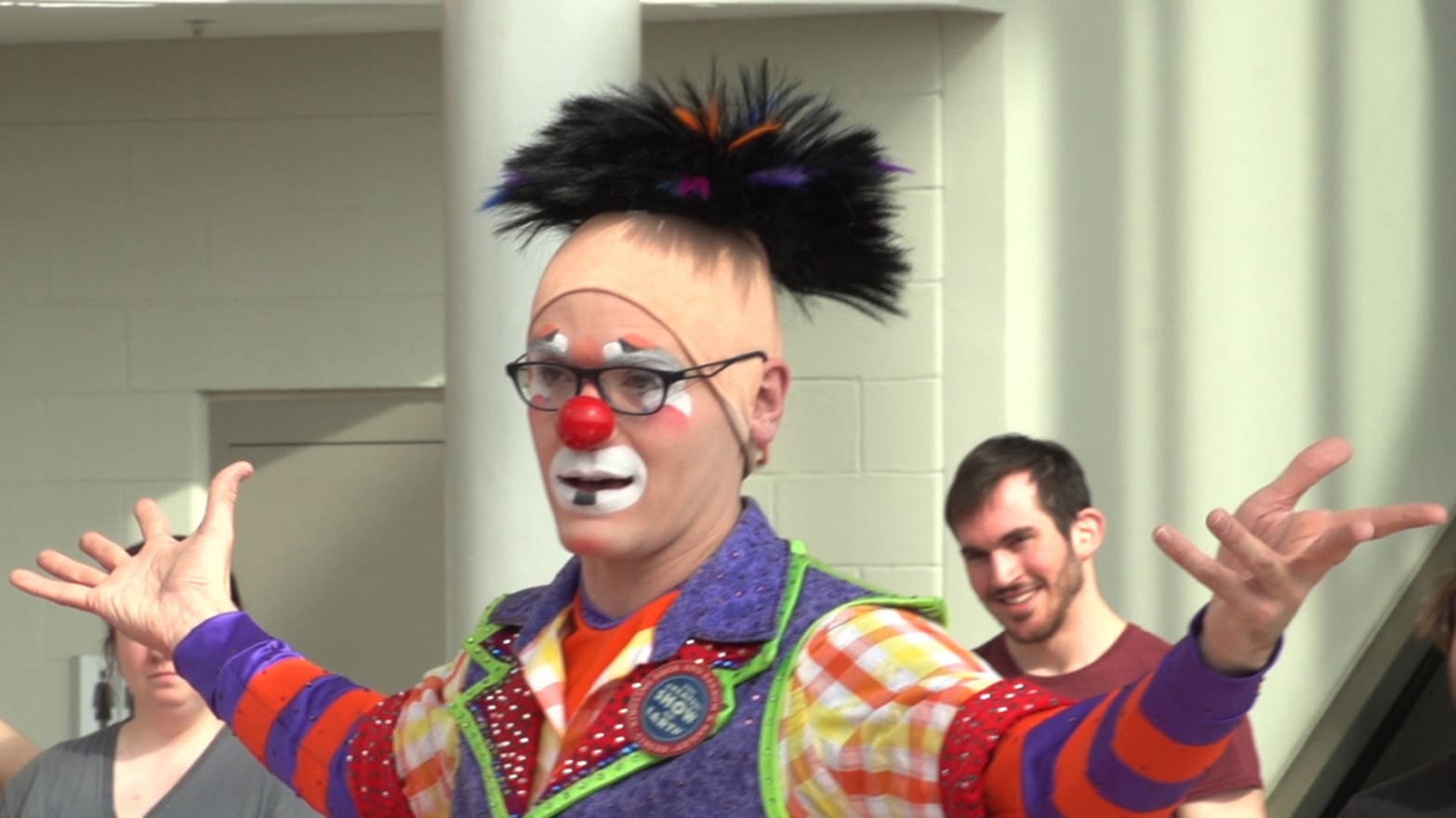“I’ve tried to settle down in life. I’ve tried to get real jobs. I’ve tried relationships. But this is where my heart belongs.”
When 39-year-old Richard Kirsch heard about a recent Ringling Brothers Circus clown-casting call in Newark, New Jersey he figured it was worth the 7-hour drive from Virginia, with his white-haired father and white rabbit puppet in tow.

“I’ve never been able to give 100 percent to anything else but Ringling Brothers,” Kirsch tells me. Like most of those trying to hit the big time under the big top, he isn’t dressed in character. He’s unshaven. He wears voluminous sweatpants and a raggedy Bozo the Clown t-shirt, his salt-and-pepper hair sculpted like a soft-serve cone plopped on his head.
Kirsch has just completed his three-minute audition for Ringling Bros. and Barnum & Bailey's Clown College. To the uninitiated, it looks like a bizarro take on a classic clown act. Kirsch pulls his stuffed rabbit from a hat, which refuses to do tricks, sabotaging his partner’s schtick. It is, in a way, a lighthearted routine with a dark subtext: many of those gathered are accustomed to failure at auditions.
Indeed, the odds of being accepted into the Clown College and then graduating into the world’s most recognizable circus company are slim. And today Kirsch is performing alongside 20 other hopefuls, all attempting to persuade a panel of judges—a rather serious looking group of Ringling veterans—that they deserve the brass ring of the clown world: a coveted slot as a touring Ringling Brothers clown.
Kirsch first auditioned for the circus in 1994 and “made it to the final round of cuts” for the next three consecutive years, he tells me, pausing to clap at the end of another audition. His stubborn efforts to fulfill his dream have yet to pay off, but he carefully lists all the near misses. Making it to the final cut again in 1995. And again in 1996. And again in 1997.
“One of these years! I keep the optimism up.”
******
Think of the circus and one thinks of the atmospherics: the big-top tent buzzing with red-nosed lunatics on unicycles and stilts, the circus ring lit by soft yellow spotlights, the familiar and jaunty “Entry of the Gladiators” on endless loop. But the scene at Newark’s Prudential Center—home of the New Jersey Devils hockey team—is stripped of pageantry, except for a few small balloon towers flanking a Ringling Brothers poster.
There is no sign of the beefy NHL players who usually inhabit the place. Today, a small corner of the building is packed with spindly, aspiring clowns filling out forms on folding chairs. It’s more job fair than Fellini film.
Cameron Lee Conlon is dressed in a fuschia button-down shirt, pinstripe vest (with matching trousers), accented with sparkling faux diamond earrings. He nervously taps a baton between his legs while chatting to his mother (they also drove up from Virginia) as the Ringling clowns greet auditioners by the door. “That’s Taylor, the Boss Clown,” he enthuses in a clipped Southern drawl. “I’m soooo excited!”
Conlon left college in 2008 and, in his slightly contradictory admission, was “working full-time on and off” for the past two years, as a “licensed cosmetologist and all this other stuff.” But he becomes animated when talking about his background in musical theater, improv comedy, and character acting. “I worked at Disney World for eight months. It was awesome! I got to be Eeyore and Miss Piggy and Jack Sparrow.”
Conlon isn’t a clown. He’s an aspiring clown.“I’d be a third generation clown if I get this gig,” he says, introducing me to his mother, Becky, who adds proudly that her parents were clowns and her father was a “Shriner clown from the Masonic Lodge” in Indiana. I nod—impressive!—despite having no idea what this means. (According to a quick Google search, a Shriner clown appears to be a clown who is also a member of the Shriners.) “He taught me and my brother clowning, and all of the children of Shriner clowns in our town formed our own little clown unit and worked at birthday parties and parades.”
I ask Conlon if he’s nervous. “I’d be a fool if I wasn’t. I’m being given a chance to audition for one of the most recognizable brands on Earth to perform in front of hundreds of thousands of complete strangers in various cities, multiple times a year. All I get to do is make people happy for a year and that’s all I want to do.”
Ask anyone here why they have pursued clowning, and you’ll likely get some variation on this answer. It can’t be the money. And for the average clown, there isn’t much fame involved either. But almost all auditioners, displaying a strange mixture of benevolence and altruism, underscore that they want to clown for the benefit of others. When introducing herself to the group and judges, a young woman says she’s wanted to be a clown since she was 10 because "I love being happy and I love being around happy people." Another proclaims: “I love making people laugh.”
Of course, even clowns aren't exempt from a desire for recognition. "I am the giant chocolate M&M in Times Square,” one female clown joked, “and would love to do a physical performance where someone could actually see my face." But she’s also a little bit serious.
Taylor Albin, Ringling’s Boss Clown, leads the troupe in a series of exercises. With an alabaster smile painted around his mouth, a tuft of black hair sprouting from the top of his bald wig, a crimson nose, and an oversized measuring tape draped around his neck, he's a coulrophobe’s worst nightmare—and the person auditioners are desperate to impress. When Albin instructs the hopefuls to "get into a position a snowman would get into," they frantically contort their limbs and faces into maniacal expressions. And none look much like snowmen.
During another group impersonation exercise, it devolved from the amateur to the awful: one young woman is instructed to act like someone “running for Republican office” and ends up prancing around on the balls of her feet, clapping her hands and shouting, “We’re gonna do it! Yeah!” She appears to be inhabiting the body of a women’s basketball coach.
It’s during the individual auditions, though, that hopefuls are given three painfully long minutes to shine. While most auditioners make generous use of juggling and the hackneyed obstinate-limb-with-a-mind-of-its-own gag, the judges howl with delight when a rotund woman simulates squeezing into a ballerina’s outfit, tucking her large breasts into an imaginary tutu. Another shovels strings of rubber bands into his mouth like spaghetti, provoking more caterwauling from the judges. Clowns, it turns out, are a fantastic audience.
Meanwhile, two people who accompanied their clown friends to the tryouts are fast asleep in their folding chairs. The clowns love this stuff, but the laughs are mostly lost on the rest of us; those who don’t inhabit this world and whose knowledge of clowns stops at Krusty, the Insane Clown Posse, and Bozo.
******
The judges have been consistently amused throughout the auditions, but Cameron Lee Conlon’s act seems to fall short, eliciting only sporadic laughter. Nor is it clear that Richard Kirsch’s audition won them over, and I can’t help but wonder, despite his sanguine attitude and years of almost cracking the code, whether he’ll be at future tryouts. “I found out last year that they were holding auditions in Dallas. My friend Larry Clark hinted that maybe I got accepted, and apparently I made it real close but got cut at the last minute."
When I ask a Ringling Brothers spokeswoman whether Richard and Cameron will soon find out if they made the cut, she tells me “there isn’t really a straight answer – the Clown College audition process varies in length and consists of several rounds. If we’ve discovered any really legendary talent, we will let them know as soon as we can.”
Richard, waiting years for someone to discover his legendary talent, seems more patient than ever when recounting twenty years of almost “making the final cut.” Relationships and “real jobs” aren’t for him, after all, and his parents are as supportive now as they were when he started. Because regardless of today’s outcome, his heart will still belong to the Ringling Brothers. And when you’ve devoted your entire adult life to chasing a dream, there’s always next year.

